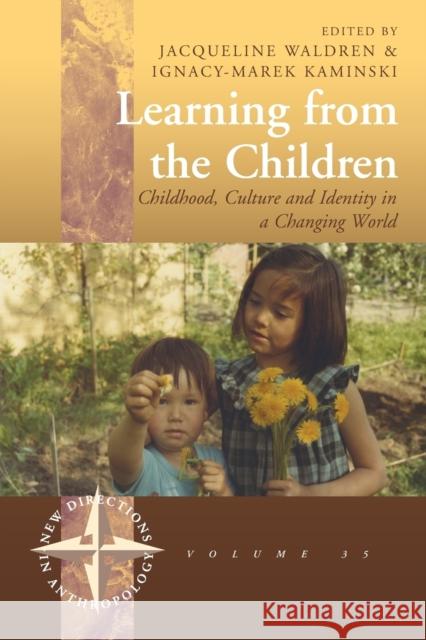Learning from the Children: Childhood, Culture and Identity in a Changing World » książka
Learning from the Children: Childhood, Culture and Identity in a Changing World
ISBN-13: 9781782386759 / Angielski / Miękka / 2014 / 204 str.
Learning from the Children: Childhood, Culture and Identity in a Changing World
ISBN-13: 9781782386759 / Angielski / Miękka / 2014 / 204 str.
(netto: 130,37 VAT: 5%)
Najniższa cena z 30 dni: 135,22
ok. 22 dni roboczych.
Darmowa dostawa!
"The greatest strength of the volume lies in the diverse mix of perspectives represented by the authors. These come from a range of disciplines, including anthropology and sociology. Many have practical experience of the issues discussed through backgrounds in community and NGO work, and through roles including as policy officers and development consultants. Often both consultants and academics, the authors deliver unique testimonies and insights based on their personal and direct involvement in the cases they discuss." - Journal of the Royal Anthropological Institute "This volume is an important contribution to the literature on children, their life worlds and child-parent interaction in multicultural settings. It is not entirely new that children have agency. The merit of the authors of this volume is that they are starting to address which strategies children may use both to strengthen and utilize this agency, and not the least point at limitations of agency." - Harald Beyer Broch, University of Oslo "Overall this is a strong volume with a coherent narrative and some very rich ethnography. I enjoyed reading it-all the contributors write well and have focused on the themes of the book. The links made between academic and practitioner work were very well done and the personal voices of the authors come through strongly. This is often an extremely hard task to pull off without becoming self-indulgent but in this case it worked very well." - Heather Montgomery, The Open University, UK Children and youth, regardless of their ethnic backgrounds, are experiencing lifestyle choices their parents never imagined and contributing to the transformation of ideals, traditions, education and adult-child power dynamics. As a result of the advances in technology and media as well as the effects of globalization, the transmission of social and cultural practices from parents to children is changing. Based on a number of qualitative studies, this book offers insights into the lives of children and youth in Britain, Japan, Spain, Israel/Palestine, and Pakistan. Attention is focused on the child's perspective within the social-power dynamics involved in adult-child relations, which reveals the dilemmas of policy, planning and parenting in a changing world.
"The greatest strength of the volume lies in the diverse mix of perspectives represented by the authors. These come from a range of disciplines, including anthropology and sociology. Many have practical experience of the issues discussed through backgrounds in community and NGO work, and through roles including as policy officers and development consultants. Often both consultants and academics, the authors deliver unique testimonies and insights based on their personal and direct involvement in the cases they discuss." · Journal of the Royal Anthropological Institute"This volume is an important contribution to the literature on children, their life worlds and child-parent interaction in multicultural settings. It is not entirely new that children have agency. The merit of the authors of this volume is that they are starting to address which strategies children may use both to strengthen and utilize this agency, and not the least point at limitations of agency." · Harald Beyer Broch, University of Oslo"Overall this is a strong volume with a coherent narrative and some very rich ethnography. I enjoyed reading it-all the contributors write well and have focused on the themes of the book. The links made between academic and practitioner work were very well done and the personal voices of the authors come through strongly. This is often an extremely hard task to pull off without becoming self-indulgent but in this case it worked very well." · Heather Montgomery, The Open University, UKChildren and youth, regardless of their ethnic backgrounds, are experiencing lifestyle choices their parents never imagined and contributing to the transformation of ideals, traditions, education and adult-child power dynamics. As a result of the advances in technology and media as well as the effects of globalization, the transmission of social and cultural practices from parents to children is changing. Based on a number of qualitative studies, this book offers insights into the lives of children and youth in Britain, Japan, Spain, Israel/Palestine, and Pakistan. Attention is focused on the childs perspective within the social-power dynamics involved in adult-child relations, which reveals the dilemmas of policy, planning and parenting in a changing world.











